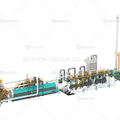Healthy soil is the foundation of productive agriculture and sustainable ecosystems. However, modern agricultural practices, deforestation, and climate change have significantly degraded our soil quality. To address this issue, biochar production has emerged as a powerful tool for soil improvement. Biochar, a charcoal-like substance produced through pyrolysis of organic materials, offers numerous benefits when incorporated into soil. In this post, we will explore how biochar production can positively impact soil health, enhance nutrient retention, improve water management, promote microbial activity, sequester carbon, and mitigate climate change. See the biochar equipment.

Enhancing Soil Structure and Nutrient Retention
Biochar exhibits remarkable properties that enhance soil structure and support nutrient retention. When biochar is added to soil, it creates a porous matrix, increasing its water-holding capacity and reducing soil compaction. This improved structure allows better root penetration, promoting plant growth and development. Additionally, biochar has a high cation exchange capacity (CEC), enabling it to attract and retain nutrients like nitrogen, phosphorus, and potassium. These nutrients are then slowly released to plants over time, reducing leaching and optimizing their availability for optimal growth.
Improving Water Management
Biochar acts as a sponge in the soil, improving water management and reducing water stress on plants. Its porous nature increases soil water retention, minimizing runoff and preventing erosion. This property is particularly beneficial in arid and drought-prone regions, where water scarcity is a significant challenge. Moreover, biochar's ability to retain water also reduces irrigation requirements by extending the intervals between watering. This not only conserves water but also promotes more efficient water use in agriculture and landscaping.
Promoting Microbial Activity
Soil microorganisms play a crucial role in maintaining soil fertility and nutrient cycling. Biochar provides a favorable habitat for beneficial microorganisms, promoting their growth and activity. The porous structure of biochar acts as a refuge for microorganisms, protecting them from predation and providing a stable environment. Additionally, the presence of biochar in soil creates a diverse microbial community, enhancing nutrient cycling processes such as decomposition and mineralization. This leads to improved soil fertility and nutrient availability for plants, resulting in healthier and more resilient ecosystems.
Carbon Sequestration and Climate Change Mitigation
Biochar production offers a sustainable solution for carbon sequestration and climate change mitigation. During the pyrolysis process, organic materials are transformed into stable carbon structures that resist decomposition in soil over long periods. By burying biochar in the ground, carbon is effectively removed from the atmosphere and stored in the soil, reducing greenhouse gas emissions. This carbon sequestration not only helps combat climate change but also contributes to the restoration of degraded soils. Furthermore, the application of biochar in agricultural practices reduces the need for synthetic fertilizers, which are energy-intensive to produce and contribute to greenhouse gas emissions.

Conclusion
Biochar production has emerged as an effective approach for soil improvement, offering a wide range of benefits. Its ability to enhance soil structure, retain nutrients, improve water management, promote microbial activity, sequester carbon, and mitigate climate change makes it a valuable tool in sustainable agriculture and ecosystem restoration. Incorporating biochar into farming systems can lead to increased crop productivity, reduced environmental impact, and enhanced resilience against climate variability. However, further research is needed to determine optimal biochar application rates, its impact on different soil types, and its long-term effects on soil health. Embracing biochar production and utilization holds great potential for building healthier soils and creating a more sustainable future.





